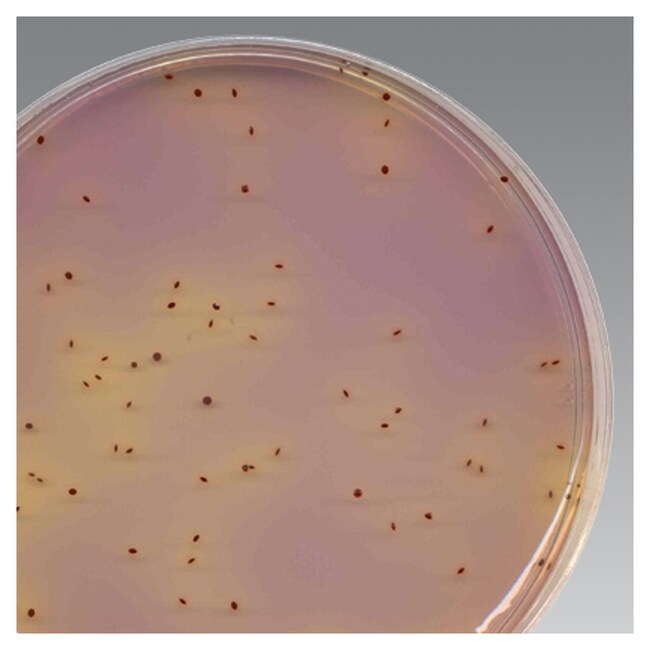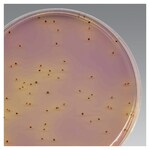Search Thermo Fisher Scientific
- Order Status
- Quick Order
-
Don't have an account ? Create Account
Search Thermo Fisher Scientific



Isolate and enumerate enterococci in food, milk, water and environmental samples with selective Thermo Scientific™ Oxoid™ K-F Streptococcus Agar (Dehydrated) by pour-plate or membrane filtration method. The presence of enterococci in the material under test is indicative of fecal pollution by man or animals. K-F Streptococcus Agar is based on the formula described by Kenner et.al.1 and is selective for Group D and Group Q enterococci.
| Certifications/Compliance | Industrial Reference: USDA. |
| Description | K-F Streptococcus Agar Base |
| Form | Powder |
| Product Type | Agar |
| Quantity | 500 g |
| Yield | For 6.5L medium |
| Unit Size | Each |
| Catalog Number | Specifications | Unit Size | Quantity | Price (HKD) | |||||||||||||||||||||||||||||||||||||||||||||||||||||||||||||||||||||||||||||||||||||||||||||||||||||||||||||
|---|---|---|---|---|---|---|---|---|---|---|---|---|---|---|---|---|---|---|---|---|---|---|---|---|---|---|---|---|---|---|---|---|---|---|---|---|---|---|---|---|---|---|---|---|---|---|---|---|---|---|---|---|---|---|---|---|---|---|---|---|---|---|---|---|---|---|---|---|---|---|---|---|---|---|---|---|---|---|---|---|---|---|---|---|---|---|---|---|---|---|---|---|---|---|---|---|---|---|---|---|---|---|---|---|---|---|---|---|---|---|---|---|---|
| CM0701B | Each | 500 g | Request A Quote | ||||||||||||||||||||||||||||||||||||||||||||||||||||||||||||||||||||||||||||||||||||||||||||||||||||||||||||||
| |||||||||||||||||||||||||||||||||||||||||||||||||||||||||||||||||||||||||||||||||||||||||||||||||||||||||||||||||
The natural habitat of fecal streptococci is the gastrointestinal tract of warm-blooded animals. The enterococcus subgroup of fecal streptococcus is a valuable bacteriological indicator for determining the extent of fecal contamination of recreational surface waters.
The detection of enterococci in the samples provides more specific information about the source of pollution because enteroccoi are host specific. For example, a predominance of Enterococcus bovis and Enterococcus equinus would indicate pollution due to animal excrement.
The detection of Enterococcus bovis and Enterococcus equinus species has been found to be associated with pollution involving meat processing plants, dairy wastes and feedlot and farmland run-off.
The detection of these enterococcal species is indicative of recent contamination as the organisms survive for only a short period outside their natural habitat. The coliform/enterococci ratios may also provide information on possible sources of pollution2.
Caution must be observed when assessing the quality of marine recreational waters, particularly in tropical climates, because a high incidence of false-positive presumptive counts for enterococci may occur. Anaerobic incubation of tropical marine water samples is recommended3.
Colonies of enterococci on the membrane filter or agar plate are red or pink with a variation in diameter from 0.3 to 2mm. It is recommended that counting should be done with the aid of a low power (10-15 magnification) binocular wide field dissecting microscope or equivalent optical device.
KF Streptococcus Agar Medium is selective for the following Group D and Group Q species.
Enterococcus group
| Enterococcus fecalis | Group D |
| Enterococcus subsp. liquefaciens | Group D |
| Enterococcus fecalis subsp. zymogenes | Group D |
| Enterococcus faecium | Group D |
| Enterococcus bovis | Group D |
| Enterococcus equinus | Group D |
| Streptococcus avium | Group Q |
Streptococcus avium (Group Q) has been included in the `enterococci’ group as it has very similar biochemical and antigenic characteristics to the Group D species and also occurs in warm-blooded animals.
Not all products are available for sale in all territories. Please inquire.
Remel™ and Oxoid™ products are now part of the Thermo Scientific brand.
1. Kennor G.A., Clark H.F. and Kabler P.W. (1961) J. Appl. Microbiol. 9. 15-20.
2. American Public Health Association (1981) Standard Methods for the Examination of Water and Wastewater, 15th Edn. APHA Inc. Washington DC.
3. Fujioka R.S., Ueno A.A. and Narikawa O.T. (1984). Technical Report number 168, Water Resources Research Center, University of Hawaii at Manoa, Honolulu.